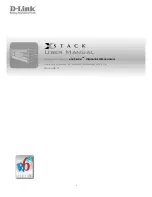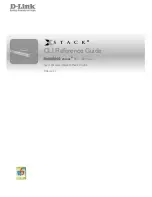
Frequently Asked Questions (FAQ)
The Power LED should be lit when the power system is working normally. If the
Power LED is not lit, please try the following:
A1:
Make sure the AC power cord is connected to the switch with power source
properly.
A2:
Make sure the voltage of the power supply meets the requirements of the input
voltage of the switch.
A3:
Make sure the power source is on.
Q1. Why is the Power LED not lit?
Please try the following:
A1:
Make sure that the cable connectors are firmly plugged into the switch and the
device.
A2:
Make sure the connected device is turned on and works normally.
A3:
The cable must be less than 100 meters long (328 feet).
Q2. Why is the Link/Act LED not lit while a device is connected to
the corresponding port?
Q3. Why are PoE ports not supplying power for PoE devices?
When the total power consumption of connected PoE devices exceeds the
maximum, the PoE port with a smaller port number has higher priority. The system
will cut off power to the ports with larger port numbers to ensure supplying to other
ports.
Take TL-SG1005P as an example. If port 1, 2 and 4 are consuming 15.4 W
respectively, and an additional PoE device with 19 W is inserted to port 3, the system
will cut off the power of port 4 to compensate for the overload.
Продукт сертифіковано згідно с правилами системи УкрСЕПРО на відповідність
вимогам нормативних документів та вимогам, що передбачені чинними законодавчими
актами України.
Safety Information
Keep the device away from water, fire, humidity or hot environments.
Do not attempt to disassemble, repair, or modify the device.
Do not use damaged charger or USB cable to charge the device.
Do not use any other chargers than those recommended.
Adapter shall be installed near the equipment and shall be easily accessible.
Place the device with its bottom surface downward.
Use only power supplies which are provided by manufacturer and in the origin
packing of this product. If you have any questions, please don’t hesitate to contact us.
TP-Link hereby declares that the device is in compliance with the essential requirements and
other relevant provisions of directives 2014/30/EU, 2014/35/EU, 2009/125/EC, 2011/65/EU
and (EU)2015/863.
The original EU declaration of conformity may be found at https://www.tp-link.com/en/ce.
EU Declaration of Conformity
IEEE802.3i, IEEE802.3u, IEEE802.3ab, IEEE802.3x,
IEEE802.3af, IEEE802.3at, IEEE802.1p
CSMA/CD
5 10/100/1000 Mbps RJ45 Ports
Auto-Negotiation MDI/MDIX
PoE Ports: Port 1-Port 4,
Total Power Supply:
40 W (TL-SG1005LP)/65 W (TL-SG1005P)
10BASE-T: UTP category 3, 4, 5 cable (maximum 100 m);
EIA/TIA-568 100Ω STP (maximum 100 m)
100BASE-TX: UTP category 5, 5e cable (maximum
100 m
); EIA/TIA-568 100Ω STP (maximum 100 m)
1000BASE-T: UTP category 5e cable or above (maximum
100 m); EIA/TIA-568 100Ω STP (maximum 1
00 m)
10 Gbps
2 K
Store-and-Forward
Automatically learning, automatically aging
External Power Adapter
Input: 100-240 VAC, 50/60 Hz
Output:
53.5 VDC /0.81 A (TL-SG1005LP)
53.5 VDC /1.31 A (TL-SG1005P)
Yes
52 mm
Standard
Protocol
Interface
General Specifications
Operating Temperature
Storage Temperature
Operating Humidity
Storage Humidity
0
˚
C to 40
˚
C (32
˚
F to 104
˚
F)
-40
˚
C to 70
˚
C (-40
˚
F to 158
˚
F)
10% to 90%RH non-condensing
5% to 90%RH non-condensing
Environmental and Physical Specifications
Specifications
Wall Mountable
Distance Between
Mounting Holes
Network Media (Cable)
Switching Capacity
MAC Address Table
Transfer Method
MAC Address Learning
PoE Disclaimer
PoE budget calculations are based on laboratory testing. Actual PoE power budget is not
guaranteed and will vary as a result of client limitations and environmental factors.
For technical support and other information, please visit
https://www.tp-link.com/support
, or simply scan the QR code.
If you have any suggestions or needs on the product guides,
welcome to email
.
To ask questions, find answers, and communicate with TP-Link
users or engineers, please visit
https://community.tp-link.com
to join TP-Link Community.
Power Supply





















